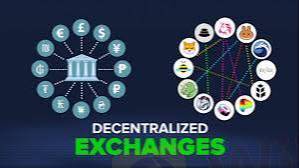
2025-02-18 05:16
IndustryThe Rise of Decentralized Exchanges
#Firstdealofthenewyearastylz
This study explores the economic implications of decentralized exchanges (DEXs) in the evolving cryptocurrency market. DEXs have disrupted traditional finance by enabling peer-to-peer asset exchanges without intermediaries, promoting transparency, and reducing transaction costs. The article analyzes the economic advantages, risks, and future prospects of DEXs while considering their regulatory challenges and market dynamics.
The advent of blockchain technology has ushered in new financial paradigms, with decentralized finance (DeFi) at the forefront. Decentralized exchanges, a core component of DeFi, allow users to trade digital assets without relying on centralized custodians. This study examines the economic factors driving the growth of DEXs, their market impact, and potential policy considerations.
The Economic Model of Decentralized Exchanges
Cost Efficiency
Centralized exchanges typically impose fees for listing, trading, and withdrawals, which can be prohibitive for smaller investors. DEXs, on the other hand, operate on smart contracts that automate and streamline transactions, reducing these costs. Additionally, users retain custody of their assets, eliminating the need for deposit fees.
Liquidity and Automated Market Makers (AMMs)
Unlike traditional order book models, many DEXs utilize AMMs, where liquidity is provided by users through liquidity pools. This model reduces price volatility, democratizes market participation, and creates new income streams through liquidity mining and staking rewards.
Network Effects and Economic Scale
DEXs benefit from the network effect, where the value of the exchange increases as more participants join. The composability of DeFi protocols also enables cross-platform interoperability, creating synergies across the DeFi ecosystem and enhancing the overall utility of DEXs.
Risks and Challenges
Impermanent Loss and Price Slippage
Liquidity providers face impermanent loss when the price of pooled tokens changes relative to the market price. Additionally, low liquidity can lead to price slippage, making large trades less favorable.
Security Vulnerabilities
DEXs are susceptible to smart contract vulnerabilities and exploits. Although transparency is a core feature, the open-source nature of smart contracts can also expose weaknesses.
Regulatory Uncertainty
The decentralized nature of DEXs challenges existing financial regulations. Many jurisdictions grapple with how to oversee and tax these platforms, leading to potential risks for users and developers.
Like 0

Kosi7429
Broker
Hot content
Industry
Event-A comment a day,Keep rewards worthy up to$27
Industry
Nigeria Event Giveaway-Win₦5000 Mobilephone Credit
Industry
Nigeria Event Giveaway-Win ₦2500 MobilePhoneCredit
Industry
South Africa Event-Come&Win 240ZAR Phone Credit
Industry
Nigeria Event-Discuss Forex&Win2500NGN PhoneCredit
Industry
[Nigeria Event]Discuss&win 2500 Naira Phone Credit
Forum category

Platform

Exhibition

Agent

Recruitment

EA

Industry

Market

Index
The Rise of Decentralized Exchanges
 Hong Kong | 2025-02-18 05:16
Hong Kong | 2025-02-18 05:16#Firstdealofthenewyearastylz
This study explores the economic implications of decentralized exchanges (DEXs) in the evolving cryptocurrency market. DEXs have disrupted traditional finance by enabling peer-to-peer asset exchanges without intermediaries, promoting transparency, and reducing transaction costs. The article analyzes the economic advantages, risks, and future prospects of DEXs while considering their regulatory challenges and market dynamics.
The advent of blockchain technology has ushered in new financial paradigms, with decentralized finance (DeFi) at the forefront. Decentralized exchanges, a core component of DeFi, allow users to trade digital assets without relying on centralized custodians. This study examines the economic factors driving the growth of DEXs, their market impact, and potential policy considerations.
The Economic Model of Decentralized Exchanges
Cost Efficiency
Centralized exchanges typically impose fees for listing, trading, and withdrawals, which can be prohibitive for smaller investors. DEXs, on the other hand, operate on smart contracts that automate and streamline transactions, reducing these costs. Additionally, users retain custody of their assets, eliminating the need for deposit fees.
Liquidity and Automated Market Makers (AMMs)
Unlike traditional order book models, many DEXs utilize AMMs, where liquidity is provided by users through liquidity pools. This model reduces price volatility, democratizes market participation, and creates new income streams through liquidity mining and staking rewards.
Network Effects and Economic Scale
DEXs benefit from the network effect, where the value of the exchange increases as more participants join. The composability of DeFi protocols also enables cross-platform interoperability, creating synergies across the DeFi ecosystem and enhancing the overall utility of DEXs.
Risks and Challenges
Impermanent Loss and Price Slippage
Liquidity providers face impermanent loss when the price of pooled tokens changes relative to the market price. Additionally, low liquidity can lead to price slippage, making large trades less favorable.
Security Vulnerabilities
DEXs are susceptible to smart contract vulnerabilities and exploits. Although transparency is a core feature, the open-source nature of smart contracts can also expose weaknesses.
Regulatory Uncertainty
The decentralized nature of DEXs challenges existing financial regulations. Many jurisdictions grapple with how to oversee and tax these platforms, leading to potential risks for users and developers.
Like 0
I want to comment, too
Submit
0Comments

There is no comment yet. Make the first one.

Submit
There is no comment yet. Make the first one.